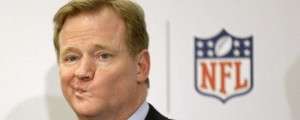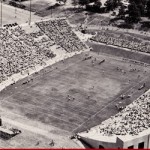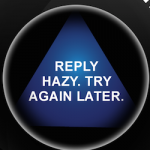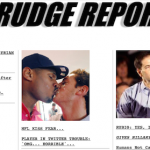Bread and circuses: A reading list
Maximus [after swiftly dispatching another gladiator]: “Are you not entertained? Are you not entertained? Is this not why you are here?”
Gracchus: The beating heart of Rome is not the marble of the senate, it’s the sand of the coliseum.”
Proximo: “I know that you are a man of your word, General. I know that you would die for honor, for Rome, for the memory of your ancestors. But as for me? I’m an entertainer.”
— from the movie Gladiator.
 It’s been a tough month to be a fan of the NFL. The stories aren’t coming from on the field but off, and they are ugly: allegations … allegations, hell! … video and photographic evidence of domestic abuse and child abuse, a league commissioner who is either in over his head, lying to us or both, and a league-wide culture of cover-up and snarl that would do Washington proud. Set aside the league’s issues with keeping its players from regularly inflicting brain damage on each other, and you wonder if you’re somehow complicit in some really bad stuff just by tuning in to Monday Night Football. We eats our bread and drinks our beer and watches our circuses and it all ends when we turn off the TV, right?
It’s been a tough month to be a fan of the NFL. The stories aren’t coming from on the field but off, and they are ugly: allegations … allegations, hell! … video and photographic evidence of domestic abuse and child abuse, a league commissioner who is either in over his head, lying to us or both, and a league-wide culture of cover-up and snarl that would do Washington proud. Set aside the league’s issues with keeping its players from regularly inflicting brain damage on each other, and you wonder if you’re somehow complicit in some really bad stuff just by tuning in to Monday Night Football. We eats our bread and drinks our beer and watches our circuses and it all ends when we turn off the TV, right?
At least the last few off-field scandals in the NFL have gotten us talking. And that’s a good thing. Some buddies and I typically email about sports, though we’ve been known to detour down the road to politics, weird news of the day, music, food, guy stuff. The indictment of Minnesota Vikings running back Adrian Peterson for “reckless or negligent injury to a child” (he used a switch on his 4-year-old son, as if you haven’t already heard) resulted in some remarkable, insightful exchanges — about how we grew up and what our parents did and why. About how you keep kids out of trouble, how you get their attention, how tough is “tough love.” We’re all in our late 30s or 40s or 50. We have kids that range in ages from college to due in a month.
As much as I’ve hated the NFL of late for making me angry at football, and angrier at myself for watching, there is something to be said for getting us all thinking, and listening, and thinking some more, for taking roads we may instinctively avoid.
May I recommend the following reads? If nothing else, they may help you rationalize why the hell you’re still following the NFL.
 Scandal the first: Ray Rice and domestic violence. Background: Baltimore running back Ray Rice, community pillar and face of the team, knocked out his now wife in an elevator at an Atlantic City casino. The video, recently acquired and released by TMZ, ran pretty much everywhere. Rice, originally given a two-game suspension by Roger Goodell, has been fired by the Ravens and suspended indefinitely from the league — because the video came out.
Scandal the first: Ray Rice and domestic violence. Background: Baltimore running back Ray Rice, community pillar and face of the team, knocked out his now wife in an elevator at an Atlantic City casino. The video, recently acquired and released by TMZ, ran pretty much everywhere. Rice, originally given a two-game suspension by Roger Goodell, has been fired by the Ravens and suspended indefinitely from the league — because the video came out.
Key passage #1: “On January 1, 2005, in the dark, early hours of New Year’s Day, police responded to a call from the girlfriend of Denver Broncos defensive back Willie Middlebrooks. She told them that she and Middlebrooks had fought earlier that night, and he was still angry when he came home. According to the police report, he grabbed her by the hair and then tried to choke her twice, once so forcefully that he lifted her off the floor. She was treated for injuries at a local hospital; he would later plead guilty to a misdemeanor assault charge. The Broncos traded Middlebrooks to the San Francisco 49ers later that summer. ‘The 49ers did their research and found out that Willie is a high-character guy who was in a bad situation,’ Middlebrooks’s agent told the San Jose Mercury News.
‘Sometimes guys just need a change of scenery.’
On Valentine’s Day 2005, Tennessee Titans cornerback Samari Rolle hit his wife, Danisha, giving her a gash that required three stitches over her left eye. Three weeks later, the Ravens signed him to a six-year deal worth $30.5 million. After Rolle pleaded guilty to assaulting his wife, the NFL fined him one game’s paycheck but let him play.
On April 26, 2005, Brad Hopkins, left tackle for the Tennessee Titans, pleaded guilty to assaulting his wife, Ellen. According to the police report, Hopkins became angry and choked her because she refused to stop talking to an insurance agent about adding a car to their coverage. He pleaded guilty, and the NFL suspended Hopkins for one game.
On August 28, 2005, police responded to a 911 call from the home of Tasha and Kevin Williams. They found Tasha, a Louisiana Tech University senior who had married Kevin, a Vikings All-Pro defensive tackle, earlier that summer, with two lacerations on her left forearm and blood on her white shirt. She told police that Kevin had pushed her when he saw that she wasn’t wearing her wedding ring. After she hit him with her cell phone, he threw her across the bed and into a nightstand, then jumped on her. She grabbed a knife, which he wrestled from her. Police noticed that Kevin was drunk and ‘not fully aware or really caring about what was going on.’ He pleaded guilty to disorderly conduct and was sentenced to a $1,000 fine and one year of probation. The NFL did not suspend him.
 Nine NFL players were arrested on domestic assault charges in 2005, Paul Tagliabue’s last full year as NFL commissioner. Among those nine arrests, Hopkins’s single-game penalty was the only suspension the league handed out that year. The following year, Tagliabue was succeeded as commissioner by Roger Goodell.
Nine NFL players were arrested on domestic assault charges in 2005, Paul Tagliabue’s last full year as NFL commissioner. Among those nine arrests, Hopkins’s single-game penalty was the only suspension the league handed out that year. The following year, Tagliabue was succeeded as commissioner by Roger Goodell.
Domestic violence is not a new problem in the NFL.”
Key passage #2: “I respond to football instinctively. I feel it. It taps into some dark and thrilling part of me, the sight of those magnificent athletes trying to make contact or elude it. I wish I could say that feeling is harmless, that it allows for a release of my most dangerous instincts without putting me in contact with actual danger, that it allows me to desire dominance without turning me into some kind of would-be dictator. Watching football connects me to friends and to strangers. It helps me lose myself in something bigger, something almost transcendent. It reminds me of my father, and of afternoons spent outside in the backyard learning to throw a spiral. The acrobatics of the best make me catch my breath in awe. It is just so much fun to watch.”
Take away: The women in my life seem to either love football or have no interest in it. There’s no in-between. The ones who love it enjoy watching the games, I would guess, for the same reasons that Grantland’s Louisa Thomas does — because the games help them lose themselves in something bigger, because the games connect them to friends and strangers, to the past. That last is especially true in the South, where football taps into tribal ritual. But I also suspect that they watch knowing they’re outsiders. If it’s becoming increasingly difficult to watch football, at any level, without feeling a bit like a hypocrite, I can only imagine that feeling is amplified for the women I know who love football. It ain’t easy bein’ a fan.
Must read: “Rice case: purposeful misdirection by team, scant investigation by NFL” by Don Van Natta Jr. and Kevin Van Valkenburg on ESPN.com.
Key passage: “Ravens and NFL officials have said publicly they stopped trying to obtain a copy of the inside-elevator video last spring, but (Michael J.) Diamondstein, Rice’s defense lawyer, was continuing to fight with the Revel casino and prosecutors to get a copy to help build Rice’s defense.
Ultimately, on April 1, the Revel, under subpoena, provided Diamondstein with a copy, and he received the same copy from prosecutors on April 5. By phone, Diamondstein told Cass that the video was ‘f—ing horrible’ and that it was clear ‘Ray knocked her the f— out.’ The lawyer advised Cass that the video, if released, would amount to a public relations disaster for the Ravens and for his client.
Cass listened carefully but never asked Diamondstein to provide the Ravens with a copy of the video — nor, for that matter, did anyone from the NFL ask Diamondstein for a copy, several sources say.”
Take away: This story dropped on the Friday that Goodell came out of hiding to provide more reasons why he should resign. It flushed out Ravens’ owner Steve Bisciotti, who held his own press conference Monday to (sort of) criticize the story but also own up to his role in the way the team dealt with Rice. Bisciotti was approximately 5 billion times better than Goodell — but only by virtue of appearing to be human. Van Natta, a former New York Times reporter whose profile on Jerry Jones in a recent issue of ESPN the Magazine is also a must-read, may be the best sportswriter going right now.
* * *
Scandal the second: Adrian Peterson and corporal punishment
Must read: “Punishment or Child Abuse?” by Michael Eric Dyson in the New York Times.
Key passage #1: “While 70 percent of Americans approve of corporal punishment, black Americans have a distinct history with the subject. Beating children has been a depressingly familiar habit in black families since our arrival in the New World. …
The lash of the plantation overseer fell heavily on children to whip them into fear of white authority. Terror in the field often gave way to parents beating black children in the shack, or at times in the presence of the slave owner in forced cooperation to break a rebellious child’s spirit. Black parents beat their children to keep them from misbehaving in the eyes of whites who had the power to send black youth to their deaths for the slightest offense. Today, many black parents fear that a loose tongue or flash of temper could get their child killed by a trigger-happy cop. They would rather beat their offspring than bury them.”
Key passage #2: “Like many biblical literalists, lots of black believers are fond of quoting Scriptures to justify corporal punishment, particularly the verse in Proverbs 13:24 that says, “He who spares the rod hates his son, but he who loves him is careful to discipline him.” But in Hebrew, the word translated as “rod” is the same word used in Psalms 23:4, “thy rod and thy staff, they comfort me.” The shepherd’s rod was used to guide the sheep, not to beat them. … The point of discipline is to transmit values to children. The purpose of punishment is to coerce compliance and secure control, and failing that, to inflict pain as a form of revenge, a realm the Bible says belongs to God alone.”
Take away: I’ve heard Peterson’s switching his son explained away as a regional thing (Southern culture) and a racial thing (African American culture) and even as a religious thing (see Dyson’s comments). But there’s a right and a wrong here, and, having seen those photos of Peterson’s son, it’s pretty damn clear he was wrong. But this I do know as a parent: the best parents in the world are those who (a) have never raised a child or (b) think they know how to raise everybody else’s child. Real parents fail every. damn. day.
American culture) and even as a religious thing (see Dyson’s comments). But there’s a right and a wrong here, and, having seen those photos of Peterson’s son, it’s pretty damn clear he was wrong. But this I do know as a parent: the best parents in the world are those who (a) have never raised a child or (b) think they know how to raise everybody else’s child. Real parents fail every. damn. day.
If the scandals don’t stop — and do you really think they will? — what would the future of professional football look like?
Must read: “Imagining Football in a Non-NFL World” by Bill Barnwell on Grantland.
Key passage: “There is precedent for a league eating itself alive and re-envisioning itself, just not in America. In 1992, the 22 teams in the first division of the English Football League left to create a new competition, primarily to take larger chunks of a more lucrative television deal. Within years, the new organization they formed — the Premier League — became the most prominent domestic sporting competition in the world. Like the Premier League, the NFL derives a massive portion of its annual revenue from television companies (including ESPN, which owns this website and employs me). The league generates $7 billion in media rights fees each year, which forms the vast majority of its $9 billion to $10 billion of annual revenue. If you were looking for a reason why the NFL might not be here in 30 years, you would start there. Any drop in that revenue stream would seriously affect team profitability and render the league’s current financial structure untenable. … Another logical path would see the league sued into oblivion by its ex-players. The NFL’s landmark concussion settlement from August of last year has already been renegotiated, with the cap on overall damage claims eliminated for fears that the league wouldn’t be able to pay all claims. That class-action lawsuit includes only a small subset of the players who might have suffered traumatic and/or permanent injuries during their time in the NFL. There will surely be more lawsuits in the years to come.”
Take away: The NFL may change. It may even die. But so long as there are homo sapiens, and the great god television, a good portion of us will find certain of our entertainments broadcast from the sand of a coliseum or the artificial turf of a stadium, or some other field of “play.”
______
Wow, that last comment depressed even me. You know what we need? We need to end on a high note. Or a note that’s so low it’s comical, endearing and, in its way, life-affirming. So after you’ve read all the tough stuff, read this — and maybe it’ll remind us why we play the games:
Take away: It’s not all bad. But, man, we fans could use some good news for a change. Actually, scrub that. We need no news at all — just a few magical moments to celebrate.












